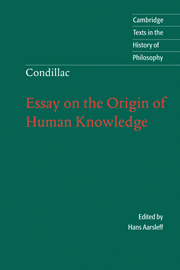Crossref Citations
This Book has been
cited by the following publications. This list is generated based on data provided by Crossref.
Pan, David
2004.
J.G. Herder, the Origin of Language, and the Possibility of Transcultural Narratives.
Language and Intercultural Communication,
Vol. 4,
Issue. 1-2,
p.
10.
Goldie, Mark
and
Wokler, Robert
2006.
The Cambridge History of Eighteenth-Century Political Thought.
Hardcastle, John
2009.
Vygotsky’s Enlightenment precursors.
Educational Review,
Vol. 61,
Issue. 2,
p.
181.
Ferber, Ilit
2010.
Herder: On Pain and the Origin of Language.
The Germanic Review: Literature, Culture, Theory,
Vol. 85,
Issue. 3,
p.
205.
Anglin-Jaffe, Hannah
2011.
Sign, Play and Disruption: Derridean Theory and Sign Language.
Culture, Theory and Critique,
Vol. 52,
Issue. 1,
p.
29.
Elyachar, Julia
2011.
The political economy of movement and gesture in Cairo.
Journal of the Royal Anthropological Institute,
Vol. 17,
Issue. 1,
p.
82.
Miščević, Nenad
2011.
No More Tears in Heaven: Two Views of Response-Dependence.
Acta Analytica,
Vol. 26,
Issue. 1,
p.
75.
Ovan, Sabrina
2012.
Nameless History Before and AfterLas Meninas: Luther Blissett's Archaeological Fiction.
Genre,
Vol. 45,
Issue. 3,
p.
423.
Christy, T. Craig
2013.
Vygotsky, Cognitive Development and Language.
Historiographia Linguistica,
Vol. 40,
Issue. 1-2,
p.
199.
Lähteenmäki, Vili
2014.
Active Perception in the History of Philosophy.
p.
223.
Sukhoverkhov, Anton V.
and
Fowler, Carol A.
2015.
Why Language Evolution Needs Memory: Systems and Ecological Approaches.
Biosemiotics,
Vol. 8,
Issue. 1,
p.
47.
2015.
A Conceptual History of Psychology.
p.
101.
Toolan, Michael
2015.
Review of Evans (2014): The Language Myth: Why language is not an instinct...
Language and Dialogue,
Vol. 5,
Issue. 3,
p.
471.
Thiel, Udo
2015.
Self and Sensibility: From Locke to Condillac and Rousseau.
Intellectual History Review,
Vol. 25,
Issue. 3,
p.
257.
McDowell, Paula
2015.
Defoe'sEssay upon Literatureand Eighteenth-Century Histories of Mediation.
PMLA/Publications of the Modern Language Association of America,
Vol. 130,
Issue. 3,
p.
566.
Wolff, Tristram
2016.
Arbitrary, Natural, Other: J. G. Herder and Ideologies of Linguistic Will.
European Romantic Review,
Vol. 27,
Issue. 2,
p.
259.
Whistler, Daniel
2016.
NATURALISM AND SYMBOLISM.
Angelaki,
Vol. 21,
Issue. 4,
p.
91.
Singer, Alan
2016.
The Senses of Personhood: Beyond Allegories of the Body.
Culture, Theory and Critique,
Vol. 57,
Issue. 3,
p.
290.
Christy, T. Craig
2016.
History of Linguistics 2014.
Vol. 126,
Issue. ,
p.
43.
Gillespie-Lynch, Kristen
2017.
Encyclopedia of Evolutionary Psychological Science.
p.
1.



